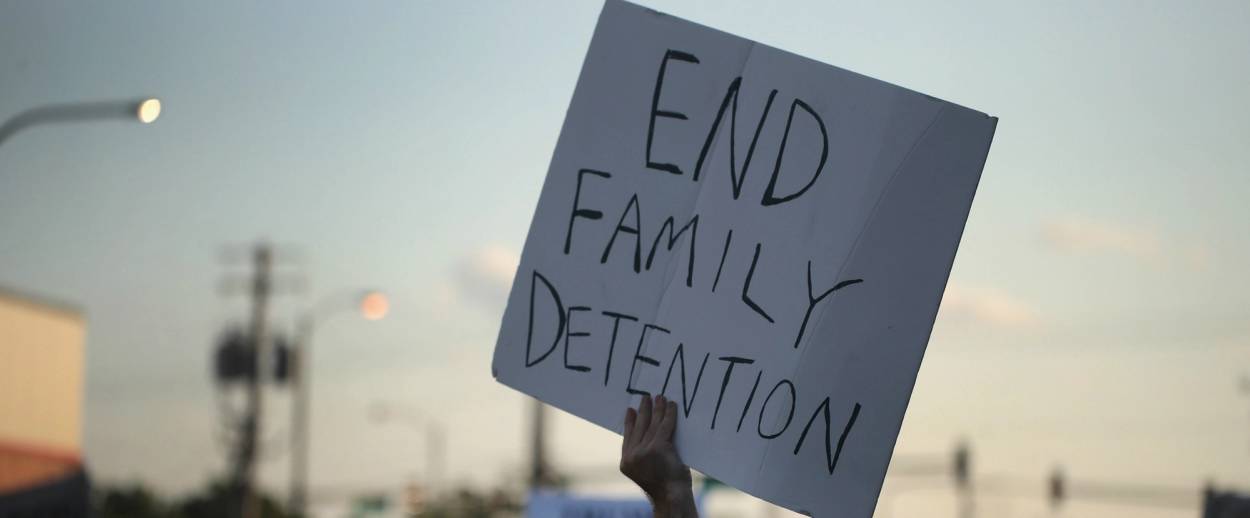Finding Timely Calls to Action in Ancient Traditions
Why I spent Tisha B’Av service at the OccupyICE tent in Portland




In October 2011, during the harvest festival of Sukkot, a number of progressive Jewish congregations in New York City held a joint Sukkot service at Occupy Wall Street. It may or may not have been called Occupy Sukkot. I can’t remember. What I remember is that we observed the ancient traditions: held hands, danced in a circle, shook the Four Species—myrtle, citron, willow and palm frond. I remember the percussive green spine of the palm frond rising into the air, rattling, the citron bumpy and cool against my palm. I remember thinking about how generations of Jews carried these traditions across continents and millenniums, until they arrived here, with us, in this unlikely corner of the world, the bright yellow citron against the gray and black and silver of Zuccotti Park.
Last night, almost seven years later, I attended a Tisha B’Av service at OccupyICE in Portland, Oregon. Tisha B’Av is the opposite of Sukkot; the saddest day of the Jewish year, it commemorates the destruction of the ancient Temple, twice, as well as other catastrophic expressions of hatred towards the Jewish community. Rather than sing and dance, traditionally, we sit on the floor in a sign of mourning, and deny ourselves even the pleasure of studying Torah.
It was a cool July evening tonight, the sky paling slowly, imperceptibly, in the way of summer sunsets in northern latitudes. As in Zuccotti Park, this was a group effort, with multiple progressive congregations joining forces to observe the holiday. The service took place just outside the wooden barricades that wall off the camp. The DHS police have closed off the four-lane street in front of the ICE building with caution tape, and they stand behind it, heavily armed; the space in front of the tape is home to ongoing protests, vigils, dance parties, and other forms of resistance to the ongoing separation of immigrant and refugee families. Tonight, it was our turn. We turned eastward for the prayers which are traditionally recited facing Jerusalem, but otherwise we faced the ICE building, sending our prayers past the cops with their automatic weapons, directly into those offices, symbol of the darkness which has taken hold of our country.
The other thing I remember about that Sukkot celebration at Occupy Wall Street is the feeling of life growing inside me. I was pregnant with my first child, and I remember that amid the protest and the song, I put my hands on my small swelling belly and gave my own private prayer of thanks. Now I have two children, ages 4 and 6, and I am acutely aware of the needs of early childhood—for love, routine, closeness, touch. The thought of those separated families makes me nearly frenzied with grief. I call my representatives, I donate, and when I can, I go down to the OccupyICE camp. I bring some ice for the camp coolers, or my violin to spread some positive energy, and when I can, I bring my kids.
I wasn’t planning to bring them to this service, since it was at night. But my husband was busy and our babysitter cancelled. So down we went. We spent most of our time inside the barricades, in the children’s tent, which my kids love because it’s full of donated toys. They found a box of out-of-season matzo in the “take what you want” pantry tent and munched on it while scooting up and down the bike path that runs down the center of camp. And for at least a little while, they stood beside me at the service as I chanted the Hebrew prayers with the group. Then we ducked out in the middle so I could put them to bed, grateful to have the simple privilege of caring for them, furious and heartsick for the separated families.
What does it mean to honor our holidays here, among the protests, rather than in our synagogues and homes? Why enact our ancient holiday traditions on this patch of pavement, where police lights never stop flashing, and people in full-body armor watch us with hands on their weapons?
Our traditions come with us into the very real, pressing problems of our time. Holding Sukkot at Occupy Wall Street might sound incongruous at first glance, but combining the harvest festival with a protest against structural economic injustice seems almost obvious when you consider the many agricultural biblical laws which explicitly address economic equity. And I can’t think of a more appropriate place to lament the destructive effects of human hatred and violence than in front of the building of a government institution which is responsible for separating thousands of innocent children from their parents.
As I walked away from the camp tonight, beneath the waxing moon on the ninth night of the lunar month of Av, I held my children’s hands tightly and said a silent prayer. May our traditions guide us in these challenging times. May they help us resist despair and cynicism. May they inspire us to act. If not for our own sakes, than for the children’s.
Alicia Jo Rabins is the creator and performer of Girls in Trouble, an indie-folk song cycle about Biblical women. Her book, Divinity School, won the 2015 American Poetry Review/Honickman First Book Prize.